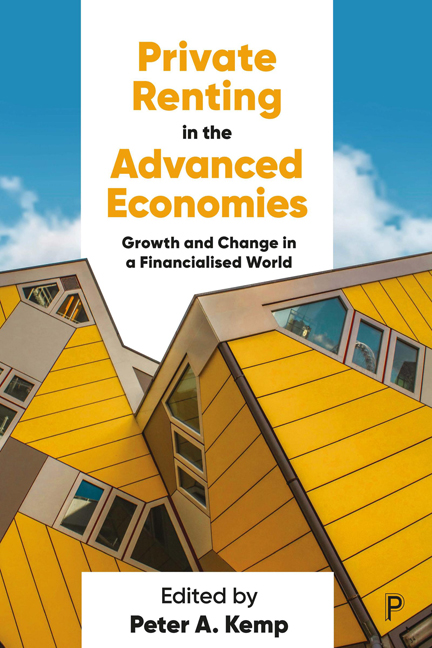Book contents
- Frontmatter
- Contents
- List of figures, tables and boxes
- List of abbreviations
- Notes on contributors
- Preface
- 1 New trajectories in private rental housing
- 2 Growth and change: private renting in Australia in the 21st century
- 3 Rental housing dynamics and their affordability impact in the United States
- 4 The Irish rental sector and the post-homeownership society: issues and challenges
- 5 Private renting in England: growth, change and contestation
- 6 Private renting in the Netherlands: set to grow?
- 7 Suppressive regulation and lower political esteem: private renting in Germany at the beginning of decline
- 8 Private renting in Denmark: foreign investors in the crosshairs
- 9 Norway: booming housing market and increasing small-scale landlordism
- 10 Private rented markets in Spain and housing affordability
- 11 The short-run impact of COVID-19 on the private rented sector
- 12 Change and continuity in private rental housing
- Index
11 - The short-run impact of COVID-19 on the private rented sector
Published online by Cambridge University Press: 03 April 2024
- Frontmatter
- Contents
- List of figures, tables and boxes
- List of abbreviations
- Notes on contributors
- Preface
- 1 New trajectories in private rental housing
- 2 Growth and change: private renting in Australia in the 21st century
- 3 Rental housing dynamics and their affordability impact in the United States
- 4 The Irish rental sector and the post-homeownership society: issues and challenges
- 5 Private renting in England: growth, change and contestation
- 6 Private renting in the Netherlands: set to grow?
- 7 Suppressive regulation and lower political esteem: private renting in Germany at the beginning of decline
- 8 Private renting in Denmark: foreign investors in the crosshairs
- 9 Norway: booming housing market and increasing small-scale landlordism
- 10 Private rented markets in Spain and housing affordability
- 11 The short-run impact of COVID-19 on the private rented sector
- 12 Change and continuity in private rental housing
- Index
Summary
Introduction
COVID-19 is a new SARS (severe acute respiratory syndrome) coronavirus disease. It spread rapidly from its origins in Wuhan, China; and despite many countries having tackled previous pandemics, many were wholly unprepared. Globalisation and technical convergence have resulted in new forms of non-calculable uncertainty where cities were the worst hit by COVID-19 because their densities and interactions facilitated the transmission of the virus and within cities the most deprived neighbourhoods were the worst hit of all (Bryson et al, 2021). To cope with the threat, economies were shut down with major supply shocks followed by major demand shocks worldwide, wiping off huge proportions of global gross domestic product (GDP) in a matter of months and destabilising money markets. Fiscal and monetary policy came together as economies and money markets were put on life support by governments, sustaining businesses, jobs and incomes, and by central banks supporting liquidity through massive purchases of, mainly government, bonds (Tooze, 2021).
Housing was both part of the way the virus was transmitted and one of the consequences of the shutdowns and market adjustments that resulted from attempts to contain the spread of the virus. This chapter explores the short-run impact of COVID-19 on the private rented sector (PRS) of the housing market in the countries discussed in earlier chapters of this volume. It considers the evidence in three contexts: first, to assess if the nature of these countries varieties of capitalism and welfare regimes are related to governments’ COVID-19 interventions in the PRS; second, to examine subnational as well as national responses; and third to assess if policy interventions can be framed by ideas about path dependency and historical institutionalism.
First, this chapter examines each country’s responses to COVID-19 in the light of an earlier comparison of the PRS in developed countries (Crook and Kemp, 2014). That showed how policies on regulation of rents and security of tenure and the extent of investment by corporate and institutional landlords were related to their types of economy and welfare regimes, using typologies developed by Hall and Soskice (2001) on varieties of capitalism and by Esping-Andersen (1990) on types of welfare regime.
- Type
- Chapter
- Information
- Private Renting in the Advanced EconomiesGrowth and Change in a Financialised World, pp. 238 - 259Publisher: Bristol University PressPrint publication year: 2023



